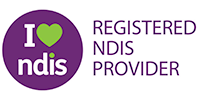In the realm of disability support work, trust forms the bedrock upon which successful relationships are built. Trust and confidence are paramount when it comes to creating a supportive environment for individuals with disabilities. To achieve this, it is imperative to establish and maintain professional boundaries.
Professional boundaries serve as a guiding light in disability support work, delineating the roles and responsibilities of support workers while safeguarding the well-being of the clients. This article aims to provide valuable insights and tips on how to maintain these crucial boundaries effectively as an NDIS provider in Adelaide.
What are Professional Boundaries?
Professional boundaries encompass a set of guidelines and expectations rooted in legal, ethical, and organisational standards. These boundaries extend into the client’s home, underscoring their significance. The primary objective of maintaining professional boundaries is to foster a productive, safe, and ethical relationship between support workers and their clients.
But how can you tell if professional boundaries in disability support work are at risk of being crossed? Here are some telltale signs to watch out for:
Signs that Professional Boundaries May Have Been Crossed
Personal Conversations
Discussions that veer into personal, marital, or financial matters.
Interactions Beyond Work
Engaging with clients outside of scheduled work hours.
Gifts of Value
Receiving or giving money or expensive gifts.
Friendship Perception
Viewing the client as a personal friend.
Member Information Disclosure:
Sharing personal details about the client.
Emotional Attachment
Developing an emotional bond.
Sexual Attraction
Experiencing romantic or sexual feelings.
Why You Must Set Professional Boundaries in Disability Support Work
Preventing Unreasonable Demands
Establishing boundaries helps prevent clients or their families from making unreasonable demands.
Reducing Stress and Burnout
Clearly defined boundaries reduce stress and the risk of burnout for support workers.
Maintaining Objective Support
Objectivity is preserved, ensuring that support remains focused on the client’s needs.
Preventing Relationship Tension
Boundaries prevent relationship tension that can cause distress to both parties.
Mitigating Grief and Loss
Setting boundaries prepares both support workers and clients for the eventual conclusion of their engagement.
5 Tips to Maintain Professional Boundaries in Disability Support Work
Now that we’ve established the importance of professional boundaries, here are five practical tips to help you maintain them effectively as an NDIS provider in Adelaide and an NDIS plan manager in Adelaide:
Maintain Respect and Privacy
Respecting your client’s privacy is paramount. Avoid prying into personal matters unrelated to your work duties. When discussing confidential matters, approach them with the utmost respect and professionalism.
Stick to the Duty of Care
Your foremost duty is to ensure the safety and well-being of your client. While being aware of their disability and living situation is essential, refrain from offering unsolicited advice on personal matters such as family, relationships, or finances.
Prevent Conflicts of Interest
Avoid crossing the line into becoming a personal friend to your client. Your role is to support them in building and strengthening their social, family, and community networks. Keep your professional boundaries intact to avoid conflicts of interest.
Set Professional Limits
Maintain a strict boundary when it comes to your relationship with your client’s family members. Do not become involved in their social or family activities. Setting these limits is essential to upholding ethical standards.
Discourage Gifting
While gestures of gratitude are appreciated, politely decline money or expensive gifts. Clearly convey that your focus is on completing your job tasks within the scope of your work.
Maintaining professional boundaries in disability support work is not only essential but also ethically and legally required. By following these guidelines and tips, you can ensure that your relationship with your clients remains supportive, respectful, and in their best interests.
Conclusion
In conclusion, professional boundaries in disability support work are vital for trust and ethical conduct. By respecting privacy, maintaining duty of care, preventing conflicts, setting limits, and discouraging gifting, support workers can ensure effective support and well-being for clients. These boundaries foster respectful and empathetic relationships, benefiting both parties involved.



